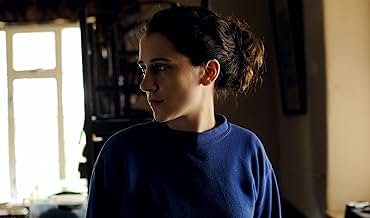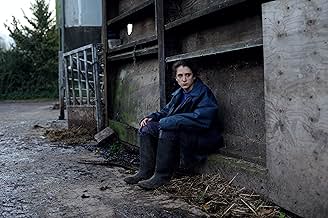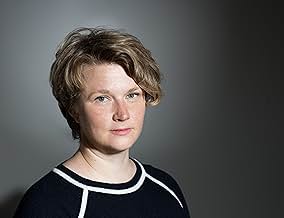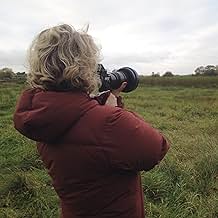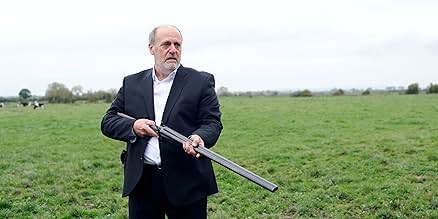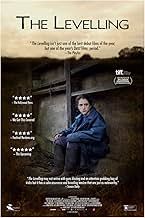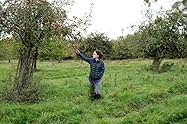IMDb RATING
6.4/10
2.9K
YOUR RATING
Trainee vet Clover Catto revisits family farm after brother's suicide. Confronts father over farm's disrepair and brother's death, uncovering family secrets and childhood revelations.Trainee vet Clover Catto revisits family farm after brother's suicide. Confronts father over farm's disrepair and brother's death, uncovering family secrets and childhood revelations.Trainee vet Clover Catto revisits family farm after brother's suicide. Confronts father over farm's disrepair and brother's death, uncovering family secrets and childhood revelations.
- Awards
- 3 wins & 6 nominations total
- Director
- Writer
- All cast & crew
- Production, box office & more at IMDbPro
Featured reviews
10balagesh
Levelling means working away the unevenness of the ground. But I had a feeling that there was another meaning in psychology. I found this, " Leveling is when people keep out parts of stories and try to tone those stories down so that some parts are excluded." (Wiki) I think this is the key to understanding film. Our protagonist returns home for his brother's funeral and has to decipher what has happened over the past few months. It's a fascinating investigation. And through the grieving process and the rather complex parent-child relationship, we get a multi-layered story.
The protagonist (and it doesn't matter her gender; in the story it doesn't matter that she is the girl of the two children) is thrown back into her past. I really liked the way the behaviour of the educated and self-conscious woman who is about to become a vet is replaced, even in a single scene, by that of a vulnerable but strong little girl.
The protagonist (and it doesn't matter her gender; in the story it doesn't matter that she is the girl of the two children) is thrown back into her past. I really liked the way the behaviour of the educated and self-conscious woman who is about to become a vet is replaced, even in a single scene, by that of a vulnerable but strong little girl.
Carson Robison sang it, farming is not for the faint-hearted. "The cow's gone dry and the hens won't lay, troubles pile up day by day. Grief and misery, pains and woes, debts and taxes, and so it goes."
There are parts of the world where farm output is measured in thousands of litres per week, but these rain-soaked acres in England ain't it. The flood of a few months ago made things a lot worse, but was this a viable dairying unit in the first place? Get rid of those cows, cut in some PVC field drainage with geotextile. Barley is used to make alcoholic beverages, muesli contains lots of oats.
Agriculture, emotional attachment, strained relationships and mental health issues - maybe they used to go together, but this combination was coming to rely increasingly on subsidies from the European Union. Is "The Levelling" about farming, or is it about a dysfunctional family who live on a farm? The technology doesn't seem to be much advanced on what was available in the 1930s. In this twenty-first century the cold-blooded business of converting soil fertility and sunshine into milk solids and butterfat entails zapping barcodes on ear-tags, uploading iPad data into laptops, and responding to endless on-line demands from government departments for information. And taxes.
In this film, family is everything, but when members of a family fall out, they're quite likely never to speak to each other again. We're simply expected to accept this dynamic, like it's a raw Scandinavian saga. It's something to do with the unforgiving land, and the malicious weather.
Aubrey the father (David Troughton) hands over the farm to his son to manage. Surely a poisoned chalice. Then the son kills himself. Clover (Ellie Kendrick) is about to complete her university qualifications in veterinary science, but she has to come back - to sort stuff out? Too many things don't make enough sense. The viewer is expected to fill in causes and effects. A cryptic crossword with ambiguous clues.
I hope "The Levelling" doesn't put young Britishers off farming. But you gotta love the land. Love it enough to compensate for the fact that the land does not love you. The land would rather be covered in forest, with squirrels and badgers.
There are parts of the world where farm output is measured in thousands of litres per week, but these rain-soaked acres in England ain't it. The flood of a few months ago made things a lot worse, but was this a viable dairying unit in the first place? Get rid of those cows, cut in some PVC field drainage with geotextile. Barley is used to make alcoholic beverages, muesli contains lots of oats.
Agriculture, emotional attachment, strained relationships and mental health issues - maybe they used to go together, but this combination was coming to rely increasingly on subsidies from the European Union. Is "The Levelling" about farming, or is it about a dysfunctional family who live on a farm? The technology doesn't seem to be much advanced on what was available in the 1930s. In this twenty-first century the cold-blooded business of converting soil fertility and sunshine into milk solids and butterfat entails zapping barcodes on ear-tags, uploading iPad data into laptops, and responding to endless on-line demands from government departments for information. And taxes.
In this film, family is everything, but when members of a family fall out, they're quite likely never to speak to each other again. We're simply expected to accept this dynamic, like it's a raw Scandinavian saga. It's something to do with the unforgiving land, and the malicious weather.
Aubrey the father (David Troughton) hands over the farm to his son to manage. Surely a poisoned chalice. Then the son kills himself. Clover (Ellie Kendrick) is about to complete her university qualifications in veterinary science, but she has to come back - to sort stuff out? Too many things don't make enough sense. The viewer is expected to fill in causes and effects. A cryptic crossword with ambiguous clues.
I hope "The Levelling" doesn't put young Britishers off farming. But you gotta love the land. Love it enough to compensate for the fact that the land does not love you. The land would rather be covered in forest, with squirrels and badgers.
A young woman (Kendrick) returns to the family farm after many years, due to tragedy -- her lone brother's apparent suicide -- and grapples with a difficult situation and a combative relationship with her father.
A very British film to me: fine performances from both Kendrick and Troughton both controlled and realistically playing their parts, moody well-shot rural scenes providing some atmosphere to the bleak world: yet also one exhaustively dour, thin on plot, drama.
It's clearly sincere in the portrayal of the realities of modern farming and rural life, which may well be it's main drive alongside the similar-yet-different father\daughter relationship, but this left me cold.
A very British film to me: fine performances from both Kendrick and Troughton both controlled and realistically playing their parts, moody well-shot rural scenes providing some atmosphere to the bleak world: yet also one exhaustively dour, thin on plot, drama.
It's clearly sincere in the portrayal of the realities of modern farming and rural life, which may well be it's main drive alongside the similar-yet-different father\daughter relationship, but this left me cold.
Clover, a veterinary student returns to the family farm following a bereavement in the family. Her father is struggling with grief over far more than this latest loss, having given up a military career to take over the farm decades earlier.
Death stalks the story as Clover's relationship with her father, mother, brother and even family dogs is explored. I almost had a feeling of in amongst the action, learning about real people through meeting them and picking up pieces of the jigsaw from each in turn. The story is so convincing that I could imagine it being filmed sequentially, with the actors learning plot twists just as we do.
Watching critically, there were perhaps two occasions when characters reacted in ways I had not expected, but I realised that they were correct and it was my anticipation that was wrong. Every revelation was something long known about but ignored or repressed. The jolt of parts falling into place was tangible; not just Clover but Aubrey and James too made discoveries about themselves and others around them.
There was minimal theatricality. Characters came and went with no introductions or explanations. Helen's character was a tiny joy, a gem of a part. The weakest character was the vicar arranging the funeral. I understand why it was necessary, but I would expect her to lead parishioners to their own conclusions, not trot out some amateur psychology. Her limited screen time would have had to be much longer to accommodate that.
Death, mud, decay, rain and stoic acceptance of tragedy run as constant themes. Images of hares play the role performed by background music in lesser films, with one swimming, then sinking lifelessly, only for the closing shot to be a hare running in the inevitable rain. No easy answers in this film, but an astonishingly brave exercise in respecting the audience to fill gaps rather than having the script explain everything.
I would be interested to know whether Hope Dickson Leach had the idea already and the real flood was a fortuitous coincidence, whether it was a hastily put together (probably largely improvised) story in response to the damage, or some other combination of theme and natural circumstance.
Death stalks the story as Clover's relationship with her father, mother, brother and even family dogs is explored. I almost had a feeling of in amongst the action, learning about real people through meeting them and picking up pieces of the jigsaw from each in turn. The story is so convincing that I could imagine it being filmed sequentially, with the actors learning plot twists just as we do.
Watching critically, there were perhaps two occasions when characters reacted in ways I had not expected, but I realised that they were correct and it was my anticipation that was wrong. Every revelation was something long known about but ignored or repressed. The jolt of parts falling into place was tangible; not just Clover but Aubrey and James too made discoveries about themselves and others around them.
There was minimal theatricality. Characters came and went with no introductions or explanations. Helen's character was a tiny joy, a gem of a part. The weakest character was the vicar arranging the funeral. I understand why it was necessary, but I would expect her to lead parishioners to their own conclusions, not trot out some amateur psychology. Her limited screen time would have had to be much longer to accommodate that.
Death, mud, decay, rain and stoic acceptance of tragedy run as constant themes. Images of hares play the role performed by background music in lesser films, with one swimming, then sinking lifelessly, only for the closing shot to be a hare running in the inevitable rain. No easy answers in this film, but an astonishingly brave exercise in respecting the audience to fill gaps rather than having the script explain everything.
I would be interested to know whether Hope Dickson Leach had the idea already and the real flood was a fortuitous coincidence, whether it was a hastily put together (probably largely improvised) story in response to the damage, or some other combination of theme and natural circumstance.
"The Levelling" is one such movie. Shot in a naturalistic style, it truly feels as though you're learning more about this family than you should. It doesn't star anyone recognizable, giving a sense of realism. The young veterinarian's return to her family farm opens the door to multiple revelations not only about the recent tragedies, but about things that have been going on for a long time.
Only a few movies have been this much like a knife in the stomach. another was "The War Zone", about a family that discovers an ugly secret. I recommend both movies, and I'm eager to see Hope Dickson Leach's next movie.
Only a few movies have been this much like a knife in the stomach. another was "The War Zone", about a family that discovers an ugly secret. I recommend both movies, and I'm eager to see Hope Dickson Leach's next movie.
Did you know
- TriviaOn the BBC News channel review of the year in film in 2017, critic Mark Kermode named this as his favourite British film of the year.
- GoofsWhen they are preparing to eat shepherd's pie, Aubrey says 'Do you want a drink James?' but when James refuses Aubrey says 'Oh come on Harry. Don't be such a girl.'
- Soundtracks13 Angels Standing Guard 'Round The Side of Your Bed
Performed & written by Thee Silver Mt Zion (as A Silver Mt. Zion)
Published by Rough Trade Records
Courtesy of Constellation
- How long is The Levelling?Powered by Alexa
Details
Box office
- Budget
- £1,000,000 (estimated)
- Gross US & Canada
- $3,040
- Opening weekend US & Canada
- $160
- Mar 26, 2017
- Gross worldwide
- $118,451
- Runtime
- 1h 23m(83 min)
- Color
- Aspect ratio
- 2.35 : 1
Contribute to this page
Suggest an edit or add missing content




